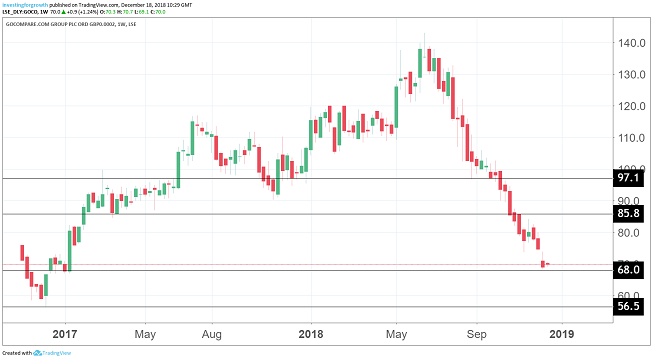Stockwatch: Is 50% collapse an opportunity?
18th December 2018 10:46
by Edmond Jackson from interactive investor
With director share buying failing to slow a decline here, companies analyst Edmond Jackson asks whether the sell-off is overdone or marks a radical change in expectations.

Plenty of stocks – especially small caps – have plunged in the second half of 2018, but which is it possible to trust?
Cluster buying can be one clue: in early November, five insiders at price comparison website group Gocompare.com bought nearly £137,500 worth around 80p, yet this did not halt the slump from 139p to a two-year low of 69p, versus 60p when floated at end-2016.
While this is a £289 million small cap stock, and is hence prone to greater volatility, a 50% fall within six months is either overdone or - if fair - marks a radical change in expectations.
Insiders buying heavily
The finance director and his wife each took 40,000 shares at around 80p, the chief executive 63,604 shares at 78.2p, one non-executive director 40,000 shares at 77.1p and another had 3,125 shares at 81p. That's hardly going out on a limb if a marker for belief in value; so, is management the better judge from inside-out or the market shrewdly discounting tougher times ahead?
People will still need to buy insurance, take initiative against policy renewals that rack jump in price by one third, and heat their homes economically. Investigating separate quotes gets tedious, so price comparison websites can at least provide a benchmark and (in my limited experience) lead you straight to a great price.
Yet the sites have endured flack. In 2012, a YouGov survey found the average commission was 24%, and there is also the claim that companies pay to appear at the top of search results.
In practice, however, I've been pleased: coincidental with my intrigue at Gocompare's stock slide, it's been time to renew my home insurance. My existing provider stung me with a proposed 30% hike in price so I tested GoCompare this last weekend and was able to buy essentially the same policy at a 36% discount to renewal price – even a 17% discount to last year's price.
Admittedly, that's just one example, but I doubt I would have improved it further – for a four-star independently- rated policy – if spending a lot more time searching around.

Source: TradingView (*) Past performance is not a guide to future performance
Revenue propped up by acquisition
The stock's chief dilemma appears a crisis for underlying revenue growth. The end-2016 flotation suited vendors – principally insurance tycoon Sir Peter Wood who raised £198 million selling a 50% stake – than new investors. Gocompare was spun out of Esure where last August he made £360 million selling his Esure stake to Bain Capital in a £1.2 billion takeover. The stock plunged with interim profits down 20% after a hit from cold weather last March and flash flooding in May.
Yes, entrepreneurs like to find new ideas, but Wood has twice opted to divest after a lengthy consumer upturn and capacity rising - both in insurance and price comparison services.
Thus, Gocompare has de-rated from a growth-type rating - an average annual historic price/earnings (PE) of 16.6 times in 2017 – after last July's interims showed revenue for the group's chief operations in price comparison easing 3.7% to £72.1 million. It blamed "lower customer interactions" explained as "a focus on targeting profitable customers as well as the downward trend on car insurance premiums."
Interim revenue was only rescued to a flat level by a £3.7 million contribution from last January's £36.5 million acquisition of MyVoucherCodes, one of the UK's largest online voucher code sites which now constitutes the "Rewards" side of the group - on a marketing margin of 63.8% versus 46.4% for price comparison.
When I did my home insurance search it came with the teaser of a free "Dine" membership offering 2for1 main meals at participating restaurants; quite how many this will appeal to I've no idea.
Last June there was also the £10 million acquisition of Energylinx, an energy comparison/switching specialist said to have more relations with domestic/business suppliers than any other comparison provider. But modest takeovers can't disguise roughly flat performance from core operations.
Given the prospective dividend yield is only about 2.5% - if forecasts are fair - it's hardly surprising investors are bailing out. This has, however, taken the stock down to a prospective PE of around 8 times on the basis of adjusted earnings per share (EPS) over 8p, management affirmed last July.
| Gocompare.com Group | Consensus forecasts | ||||||
|---|---|---|---|---|---|---|---|
| year ended 31 Dec | 2013 | 2014 | 2015 | 2016 | 2017 | 2018 | 2019 |
| Turnover (£ million) | 110 | 113 | 119 | 142 | 142 | ||
| IFRS3 pre-tax profit (£m) | 25.5 | 25.8 | 23.3 | 21.6 | 30.7 | ||
| Normalised pre-tax profit (£m) | 25.6 | 25.8 | 23.1 | 29.6 | 38.7 | 37.3 | 40.4 |
| Operating margin (%) | 22.9 | 22.6 | 19.3 | 21.0 | 28.8 | ||
| IFRS3 earnings/share (p) | 4.7 | 4.9 | 4.6 | 3.8 | 3.8 | ||
| Normalised earnings/share (p) | 4.7 | 4.9 | 4.6 | 5.7 | 5.7 | 8.0 | 8.8 |
| Earnings/share growth (%) | 3.2 | -6.4 | 25.3 | 40.7 | 9.7 | ||
| Price/earnings multiple (x) | 12.1 | 8.6 | 7.9 | ||||
| Annual average historic P/E (x) | 14.2 | 16.6 | 19.4 | ||||
| Price/earnings-to-growth (x) | 0.2 | 0.8 | |||||
| Cash flow/share (p) | 4.6 | 4.7 | 4.5 | 6.7 | 6.4 | ||
| Capex/share (p) | 0.6 | 0.6 | |||||
| Dividends per share (p) | 0.7 | 1.6 | 1.8 | ||||
| Covered by earnings (x) | 8.1 | 5.0 | 4.9 | ||||
| Yield (%) | 1.0 | 2.3 | 2.6 | ||||
| Net tangible assets per share (p) | -14.9 | -9.1 | |||||
Source: Company REFS Past performance is not a guide to future performance
Company/advisers are allowing an information vacuum
The company has itself to blame, not issuing pre-close updates. On past form, nothing will be said until end-February prelims, and who knows what the UK trading environment will be then.
If you believe Mrs May's deal can pass parliament then the stock is a 'buy'. Otherwise, the uncertainties of extending Article 50, a second referendum or a no-deal Brexit imply consumer stalemate becoming entrenched. Even class retailing acts such as ASOS are warning that things have just got a lot worse.
Superficially it would appear price comparison ought to benefit from more challenging times, although given the extent of such websites nowadays they might just tick over. Even if Gocompare is starting to offer value despite flat revenue, in uncertain times investors abhor an information vacuum.
Moneysupermarket.com doesn't inspire either
An 11 October trading update from Moneysupermarket.com cited 2% year-on-year revenue growth for the three months to end-September 2018, in context of 4% growth for the nine months to end-September, as if its growth is slowing – and retailers are now squealing about November-to-date.
There was variance, e.g. money up 7%, but insurance edged up only 2% and represented 57.2% of the total, while home services were flat. It affirms how 'commodity' home/car insurance has become highly competitive hence those stocks are priced low – to exact high dividend yields – and perhaps price comparison services are trending similarly but without same payouts (yet).
Moneysupermarket shares have de-rated nearly 30% from a two-year high of 366p in early 2018, to a recent three-year low of 257p, currently 294p where they trade on 16 times forecast earnings with 7% to 10% EPS growth projected and a 4% yield around 1.5 times covered. This is a near £1.6 billion company versus £290 million for Gocompare.
2018 EPS around 8p looks fair enough
Gocompare's interims produced a rise in basic EPS from 2.8p to 3.1p, or adjusted from 3.2p to 3.8p (adding back depreciation/amortisation), and in July the board indicated "performance skewed towards the second half-year" after a firm first half – despite its lack of revenue growth.
Operating profit rose 9.5% to £17.3 million, or by 20% to £21 million after adding back amortisation and various other "exceptional" costs including share-based payments. Income per customer interaction rose by 8.4% and marketing spend fell 12.7% to £40 million, with more efficient searches targeting profitable customers, despite a 16.8% rise in administrative expenses to £13.9 million. That's good, but the market is fretting that these improvements may be 'one-off' and revenue is stale.
A 'speculative buy' at best
There's a case to average into this stock if you believe Brexit hysteria is overdone, but you're guessing at the trading context and the yield isn't supportive.
Gocompare looks fairly priced on a portfolio investments view, although margin/cash flow attractions (see strong figures in the table) could tempt private equity if the stock continues its fall.
We've already seen Bain Capital exploit stockmarket disillusion with the extent of competition in insurance, to buy Esure for £1.2 billion – a 37% premium to market price. Speculative Buy.
*Horizontal lines on charts represent levels of previous technical support and resistance.
Edmond Jackson is a freelance contributor and not a direct employee of interactive investor.
These articles are provided for information purposes only. Occasionally, an opinion about whether to buy or sell a specific investment may be provided by third parties. The content is not intended to be a personal recommendation to buy or sell any financial instrument or product, or to adopt any investment strategy as it is not provided based on an assessment of your investing knowledge and experience, your financial situation or your investment objectives. The value of your investments, and the income derived from them, may go down as well as up. You may not get back all the money that you invest. The investments referred to in this article may not be suitable for all investors, and if in doubt, an investor should seek advice from a qualified investment adviser.
Full performance can be found on the company or index summary page on the interactive investor website. Simply click on the company's or index name highlighted in the article.
Disclosure
We use a combination of fundamental and technical analysis in forming our view as to the valuation and prospects of an investment. Where relevant we have set out those particular matters we think are important in the above article, but further detail can be found here.
Please note that our article on this investment should not be considered to be a regular publication.
Details of all recommendations issued by ii during the previous 12-month period can be found here.
ii adheres to a strict code of conduct. Contributors may hold shares or have other interests in companies included in these portfolios, which could create a conflict of interests. Contributors intending to write about any financial instruments in which they have an interest are required to disclose such interest to ii and in the article itself. ii will at all times consider whether such interest impairs the objectivity of the recommendation.
In addition, individuals involved in the production of investment articles are subject to a personal account dealing restriction, which prevents them from placing a transaction in the specified instrument(s) for a period before and for five working days after such publication. This is to avoid personal interests conflicting with the interests of the recipients of those investment articles.